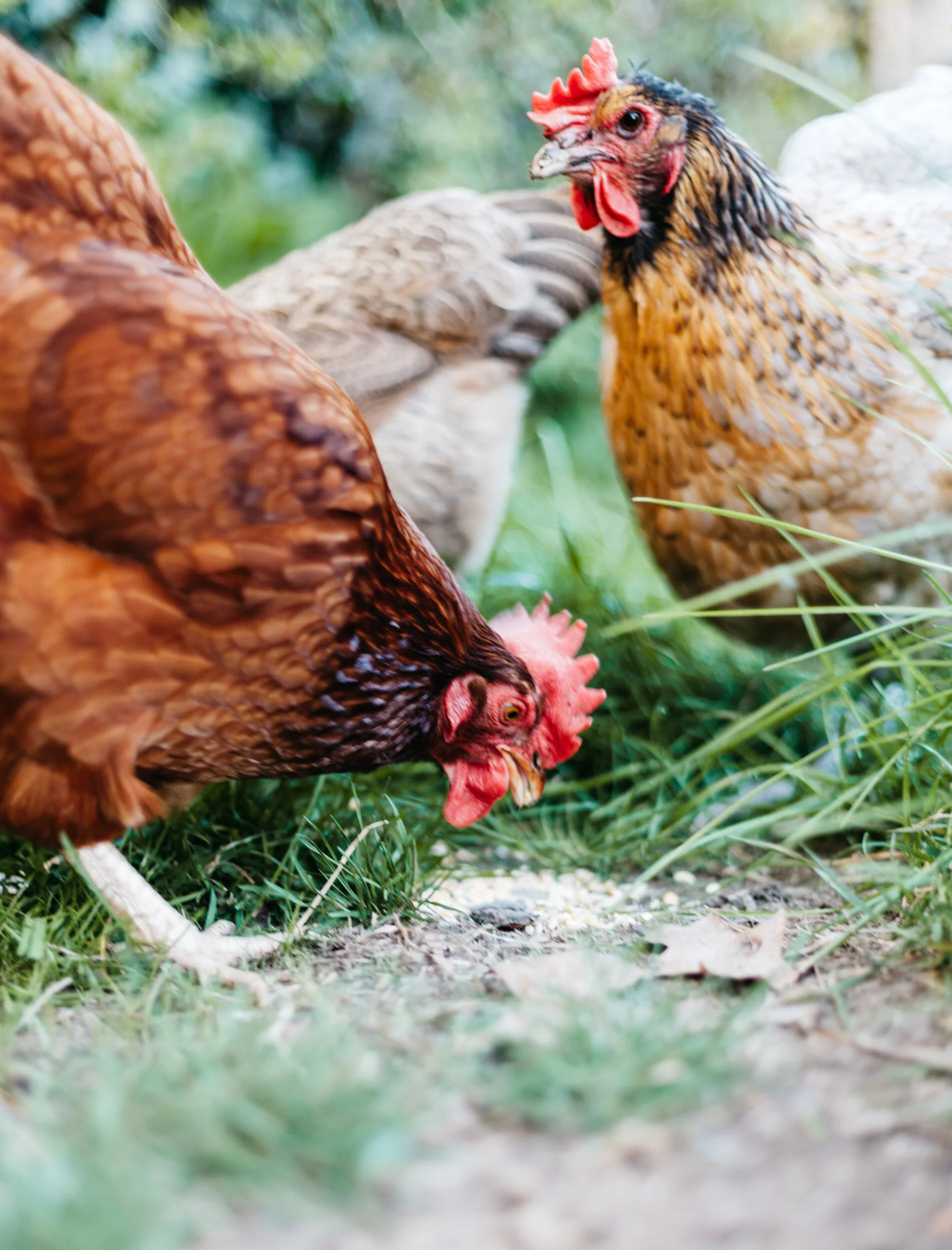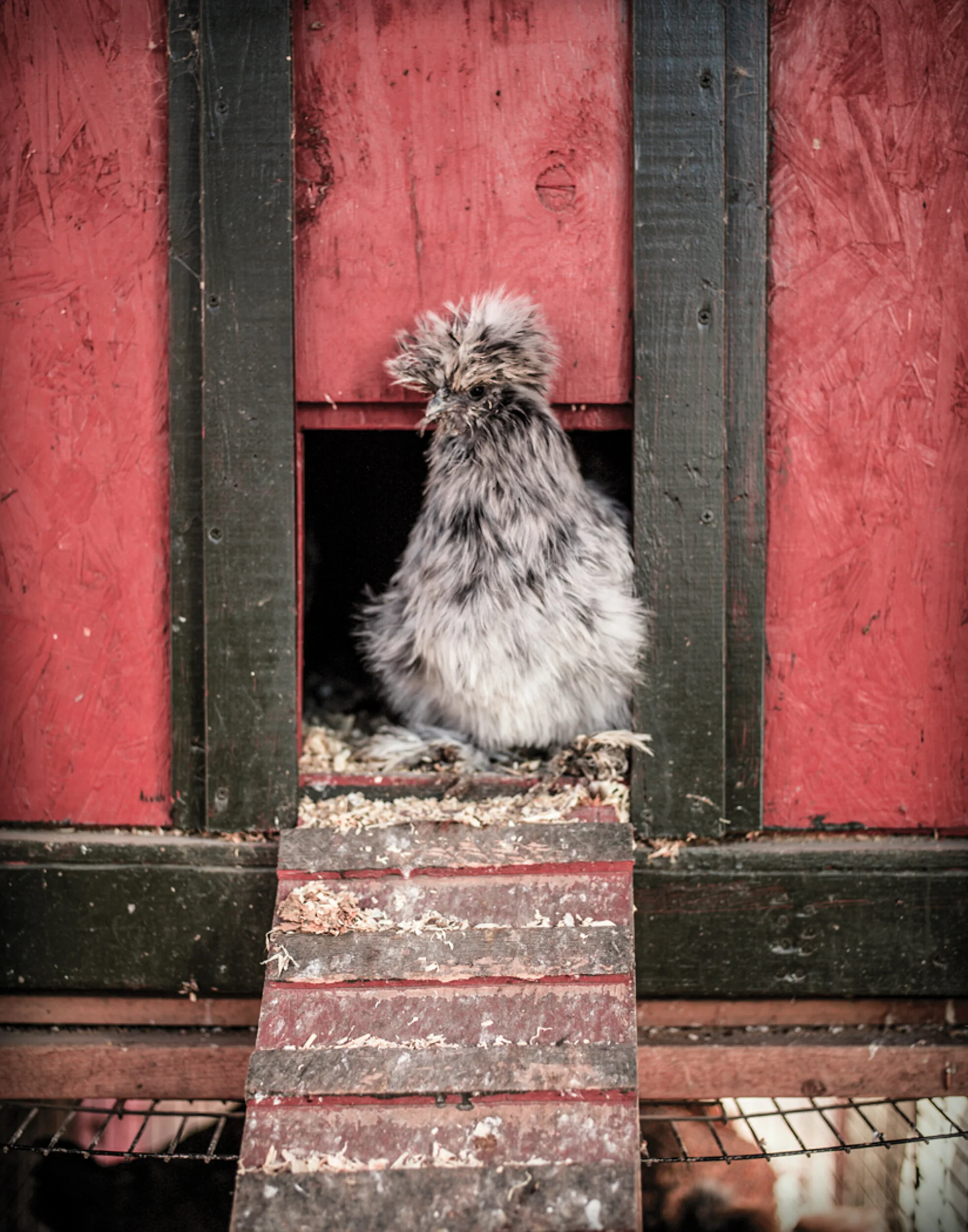Cooped Up
Photos by Michael Piazza
My friend was worried. The night would be frigid, too cold for the youngsters to be out. Her husband said she was being overprotective, stop babying them, they were nearly adults. Everyone was outside these days. There were heat lamps for this sort of thing.
They weren’t talking about a teenage daughter out on the town for winter dining al fresco. They were talking about their 8-month-old chickens, now facing their first truly cold night.
I told her about my own first brutally cold night with chickens, five years before. I’d read in online chicken forums that heat lamps were absolutely verboten because dusty straw-filled coops were tinderboxes. We brought the four hens inside the house, lined our largest dog crate with newspaper and put them in a small tiled room. They trashed the place: newsprint confetti everywhere and drinks spilled on the floor like ladies’ night out. The next night they stayed outside. They were fine.
Even before COVID descended—the hang-time none of us knew we needed to stretch our wings and try new home-based things—backyard chicken ownership was on the rise. Across Massachusetts, towns with restrictive animal ordinances found themselves henpecked with requests to change their rules. The Massachusetts Department of Agricultural Resources (MDAR) added a library of documents online to guide the new chickeners.
The practice of keeping a few companionable chickens in the backyard for eggs has been growing steadily more popular over the past 10 years. Having your own hens has always been important to those involved in the local and organic food movements. COVID-19 brought a new wake-up call, making grocery store shortages and skyrocketing costs a reality for a generation unfamiliar with the notion that staples could be cut off on short notice. And then there’s the quality of the eggs themselves. If you’ve ever had a farmfresh egg (with more antioxidants, omega-3 fatty acids and vitamins than the factory-farm variety), you know the yolks are huge like the sun and sit so high on your plate it’s like they’re crowing “Good morning!” Kids can easily become accustomed to running outside to fetch a few for scrambleds before school. And you might be surprised by the extent to which chickens can be pets.
“I thought I wasn’t going to be as attached to them as I am, but they have individual personalities and they respond to you,” says Katie Alt Griffith, whose family in Wellesley is new to chickens. “I’m an ecologist by training, but I’m embarrassed that I never paid that much attention to birds. There’s an incredible ramp-up into this whole natural world that’s all around you but you just hadn’t spoken the language. And collecting eggs never gets old. Open the hatch and it’s Christmas.”
But there’s a learning curve to being a new chicken owner, including how to care for them when something goes wrong. A chick that cost $1.50 (and, not to be crass, sells as a broiler for $10) is as expensive at an emergency clinic that handles “exotic pets” as your dog that swallowed a sock—with the same sticker shock.
“Our hen was listless, not eating or drinking, eyes closed. We brought her into the house and set up a nest in the bathroom. We were sure we were losing her, so we started out to the nearest hospital when we decided that was kind of crazy,” says Griffith. “So my 13-year-old daughter went online to a bunch of chicken forums, and we went to Sweet Meadow Farm in Sherborn for probiotic water. She injected it into blueberries, and fed them to her one by one. Five days later, she was totally fine and back out in the coop.”
WHAT NOT TO DO
DON’T get chickens because amazing eggs, free. It’s true that chicks themselves are inexpensive. But things add up, and eggs are at most $5 a dozen. Which means you probably aren’t recouping your expenses with an artisanal egg subscription service. These are the most expensive free eggs you’ll ever buy.
DON’T rush in without checking out your town’s rules. Some don’t allow chickens at all; some allow hens but not roosters; many limit the number of chickens you can have. There are often zoning ordinances about the size of your property, or the distance you must be from the edge of the nearest neighbor’s home. Check with your local health department and don’t trust old information online. With the rising popularity of raising chickens, regulations are in flux.
DON’T get the coolest, most exotic-looking hens you can find. There are some truly extraordinary, muppet-like birds out there. Vibrantly plumed and coiffed, fluffed and frizzled. But some chickens are better suited to cold climates than others. Breeds with large combs and wattles cool themselves more efficiently in arid zones but are more vulnerable to frostbite.
DON’T give them snacks 24/7, even though they come running for them and their enthusiastic greeting makes you feel like God of the Sun. Layer pellets are designed with balanced health in mind. They may not look that appetizing to us, but a regimen of the right amount of vitamins and minerals (and calcium) makes the difference between a chicken with a red vibrant comb and healthy molting patterns and one that’s susceptible to illnesses and mites, and lays a water- balloon egg with an inadequate shell.
WHAT TO DO
DO study basic chicken health. And have certain medications on hand to be prepared for certain procedures yourself: basic infections, mites, calcium deficiencies that cause the laying of eggs you’d never imagined possible. Studying chicken health is also important to recognize things that seem bizarre—like cracking an egg that has another full egg inside it, or holding an egg that feels like a water balloon— but are normal parts of nature. We just don’t see them in grocery stores, the same way we don’t often see carrots that grow with three braided stalks.
DO make sure you have a coop and run well protected from your regional predators. Coyotes, hawks, skunks, raccoons and fisher cats are all prevalent in Massachusetts. A coop and run can’t actually be built with “chicken wire,” which is a misnomer: That thin wire can be easily snapped by an aggressive fisher. Use hardware cloth on the exposed sides of your coop and run, and bury 18 inches of it horizontally under the edges, like a skirt. These predators can dig.
DO have a covered source of food, well protected from rodents, and daily fresh water. You’d be surprised how much water chickens can drink in a day, especially a hot one. When it’s below freezing, you’ll need a heating mechanism—inexpensive but critical. It’s possible to go away for a few days. Just designate a neighbor to swing by for a daily check-in—plus, free eggs.
DO have a plan for what to do when things go beyond your pay grade. Which happens quickly, when it happens, because prey animals like chickens don’t show when they are in pain. By the time they do, you hate to see them obviously suffering. Most chicken owners who’ve been at it a few years have a story of having to do something merciful. Pay close attention to warning signs—sitting still, eyes closed, not eating or drinking—and know the things that can be handled easily. A limping hen with bumblefoot (an infection like a splinter with dirt run amok) is treatable. But you have to catch it early.
DO study up when you are tempted to get more. Once you have a small variety of chickens and things are going well, you’ll want to expand your flock. Read up on how to introduce new birds, and be prepared for what to do if there’s fighting. (A time-out crate for the bully helps.) Try to avoid having only one new chicken, or one chicken that is dramatically smaller than the others (though this can be navigated too, especially if they’re raised together). Pecking order is real.
BEST RESOURCES MASSACHUSETTS
POULTRY LAWS AND INFORMATION
mass.gov/info-details/massachusetts-law-about-backyard-chickens
NORTHEAST ORGANIC FARMING ASSOCIATION
nofamass.org/urban-chickens
CHICKEN OWNERSHIP AND ADOPTION
mspca.org/pet_resources/chicken-ownership-and-adoption
THE CHICKEN CHICK
the online maven for chicken information, advice and style the-chicken-chick.com
CHICKENS AND MORE
an online magazine for chicken owners chickensandmore.com
MA BACKYARD CHICKEN OWNERS
an invaluable Facebook group for sharing resources with other backyard chickeners facebook.com/groups/869363603169748
This story appeared in the Spring 2021 issue.


